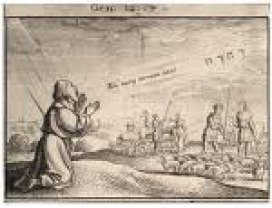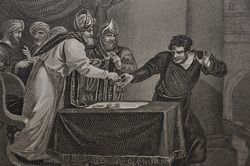None of us choose our family. Our family of origin makes a huge difference concerning which opportunities we encounter in life. In my family, I learned the value of hard work and what it takes to succeed. It was a foregone conclusion I would go to college. This step opened up additional possibilities for me personally and vocationally. Through the life of Abram, we will see how God blesses us so we can be a blessing to others.
An earlier blog taught how the family line of Shem produced Enoch who was taken up to heaven and Noah who saved the world during the universal flood. In contrast, the line of Ham produced Cush that lead to pride and the tower of Babel. Two families with two different destinies. One for good and the other for evil.
More is required from those who have been given much. Abram was also from the line of Shem like Enoch and Noah. God told Abram to leave his home and family to the land that He would show him (Gen. 12:1). He would make a great nation from Abraham’s descendants. God would bless and make his name great so he would be a blessing to the whole world. In addition, God would impart a blessing to those who bless Abram and curse those who cursed him. We define blessings as welfare, benefit and peace and curses as despise, insignificant, lightly esteemed and contempt. Those who curse Abram would be bound, hemmed in with obstacles and rendered powerless to resist. Finally, every family of the earth would be blessed through Abram (Gen. 12:2-3).
The unconditional promise God gave Abram is like receiving millions of dollars and a multitude of secret service agents for protection. How did Abram respond to this unbelievable promise? Abram left his hometown of Ur, but partially obeyed by not leaving his father’s house completely. He took his father, Terah, and his nephew, Lot. Terah died in Haran after leaving Ur (Gen. 11:31-32; 12:4-5).
God not only concerns Himself with the spiritual aspects of our lives, but our earthly lives as well (physical, social, mental and emotional aspects). Abram walked through the land and passed key landmarks that reminded him of the promise–real land, real dirt, hills, trees — real places that anyone could see (Gen. 12:6-8). Abram set up his tent and built an altar between Bethel, meaning house of God, and Ai, meaning ruin. Why is this significant?
God wanted Abram to live in balance, close to God and close to people. Notice the phrase in Gen. 12:6 about the Canaanite being in the land. Abram could be a witness of God without isolating himself from the people he was supposed to reach. Abram didn’t keep God’s blessings for himself but shared them freely since his mission was to be a blessing to others.
God intended us to be models or representatives of Christ in our day-to-day lives. We are examples without even opening our mouths! In Abram’s case, he was not a perfect example. Not only did he bring Lot with him, but he didn’t trust God’s provision since he moved to Egypt because of famine in Canaan (Gen. 12:9-10). He also lacked faith in God’s protection because Abram lied to Pharaoh saying Sarai was is sister. He feared being killed if Pharaoh found out Sarai was really his wife (Gen. 12:11-20).
Jesus Christ offers Himself to every person. Have you received Him as your personal Savior through faith in His death on the cross for the forgiveness of sin? If so, are you trusting His provision and protection for each area of your life or are you anxious or fearful? Thank God right now that in Abraham you have been blessed spiritually,
physically, socially, mentally, vocationally and emotionally.







